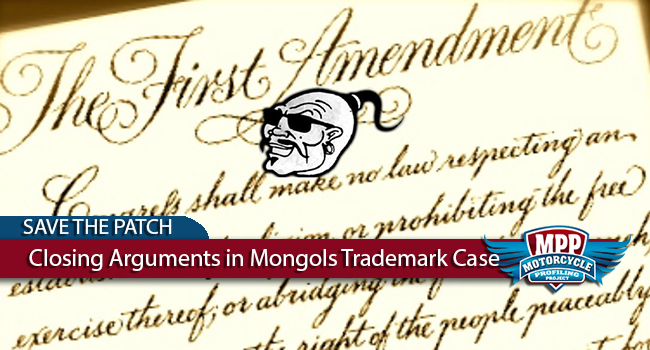The government’s goal in this case is to take a motorcycle club’s identity by giving law enforcement the legal right to force members to forfeit their colors and property bearing the Mongols MC marks. The jury now is deliberating on the guilt phase of the trial. Their decision could potentially impact the entire motorcycle club world and also limit the fundamental rights of freedom of expression and association for all Americans.
Welk’s Closing Argument
“US Attorney Welk’s entire argument is framed around the outright mocking of motorcycle culture,” says the trial observer.
“US Attorney Welk directly attacked former Minnesota Governor Jesse Ventura, self- defense Laws, men that stand their ground instead of running like cowards, and even the love and dedication women in the motorcycle world show their men.”
“It’s clear- motorcycle culture is on trial. If someone attacks you, the government wants you to retreat like a coward, and call the police. The government is trying to make it part of a crime if bikers don’t conform to their own set of morals and values,” says the trial observer.
“The US Attorney wants to dictate whether a biker ol’ lady should be allowed to wear a property vest, of her own free will. If not, the Department of Justice will try to make you pay, not only with criminal charges, but with the cruel and unusual punishment of having to listen to US Attorney Welk ramble on about it for hours, while laughing alone to his own jokes…and it’s an awkward, nerve-cringing laugh too. Oh God, please make him stop,” says the observer.
“Finally, at 3:37pm, after US Attorney Welk spent almost the entire day basking in the personal excitement of listening to his own whiny voice, in between his grunty, self- loving laughter (…everyone stood puzzled as to what could possibly be funny), the Department Of Justice finished their closing argument. The jury…sat up in their chairs, and seemed gleeful that the torture had ended.”
Defense Attorney Joseph Yanny’s Closing
According to the trial observer, Yanny’s closing set the burden of proof and gave an inspiring history on the founding fathers and power of the jury.
Yanny has previously conceded that some members had committed crimes, but said those men had been kicked out for violating rules against bringing trouble down on the the club. Yanny has also maintained that in some violent incidents Mongols simply acted in self-defense or in defense of others. 1
Who more effectively made their argument? Soon, the decision will be in the hands of the 12 people whos opinion matters the most in this phase of the case.
First Amendment Implications
Predictably the government’s argument is based around a stereotype crafted by making generalizations about motorcycle club culture based on the actions of the few. In this case, the actions of individuals that have long ago been prosecuted. In fact, if the jury brings back a verdict of guilty no one will go to jail. But they would lose their right to express their association to the Mongols MC. This violates the fundamental concepts of personal guilt and freedom of expression.
There is “no evidence that by merely wearing [1% motorcycle club] “colors,” an individual is “involved in or associated with the alleged violent or criminal activity of other [1% motorcycle club] members. It is a fundamental principle that the government may not impose restrictions on an individual “merely because an individual belong[s] to a group, some members of which committed acts of violence.” In fact, the Supreme Court has long “disapproved governmental action . . . denying rights and privileges solely because of a citizen’s association with an unpopular organization.” Healy v. James, 408 U.S. 169, 185-86 (1972).
To permit [law enforcement] to impose restrictions on any person “who wears the insignia of [a 1% club], without regard to or knowledge of that individual’s specific intent to engage in the alleged violent activities committed by other members, is antithetical to the basic principles enshrined in the First Amendment and repugnant to the fundamental doctrine of personal guilt that is a hallmark of American jurisprudence.” 2
Precedent
The outcome of this trial is likely a looking-glass into the future of the government’s one- sided war against motorcycle clubs. Australia, Europe, and Canada have all focused on various strategies to make motorcycle club membership illegal. The MPP believes that trademark forfeiture is American law enforcement’s attempt to achieve the same outcome. None of those countries have a 1st Amendment. If the government succeeds in this case, our fundamental understanding of the protections the 1st Amendment provides will be completely rewritten.
Of course, this case is in a district court. Precedent will not be created until the decision is ultimately appealed and decided by a higher court. Regardless, even success at the district court level will embolden the US Attorney’s office to employ this strategy against other motorcycle clubs and ultimately other organizations.
Sources
1courthousenews.com, Courthouse News Service, Feds Pull Out All the Stops Against Mongols Biker Gang, November 1, 2018
2see Coles v. Carlini 162 F.Supp.3d 380 (2015)
The post US Attorney’s Embarrassing Closing at Mongols MC Trial appeared first on Motorcycle Profiling Project.




